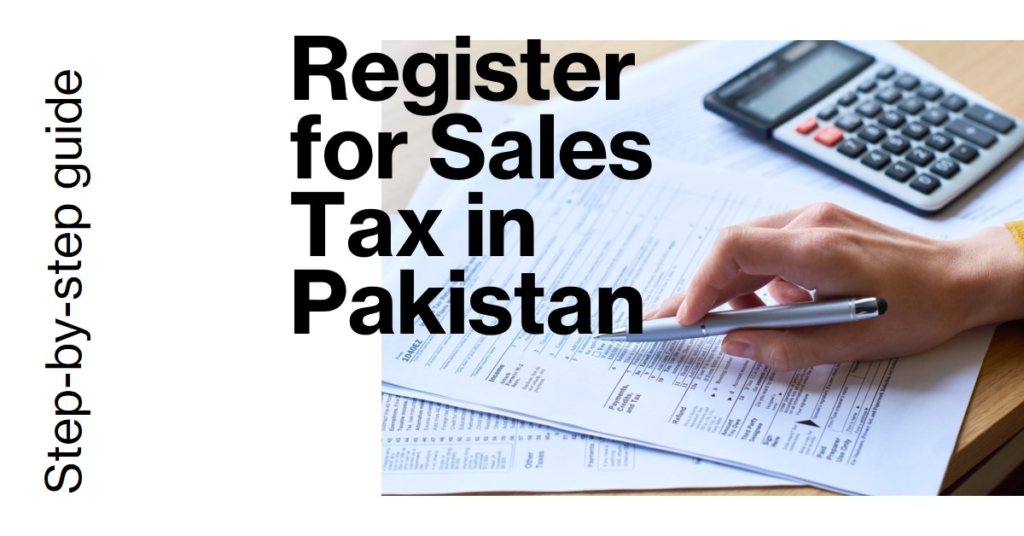Introduction:
Sales tax registration is a crucial requirement for businesses operating in Pakistan. It enables the government to effectively collect taxes on the sale of goods and services and contributes to the overall economic development of the country.
Definitions:
Sales Tax: Sales tax is a consumption tax imposed by the government on the sale of goods and services. In Pakistan, it is governed by the Sales Tax Act, 1990, and administered by the Federal Board of Revenue (FBR).
Taxable Person: A taxable person refers to an individual, partnership, company, or any other entity engaged in the business of making taxable supplies.
Taxable Supplies: Taxable supplies include the sale of goods or services on which sales tax is levied.
Process of Registering for Sales Tax:
Determine Eligibility: Before proceeding with the registration process, businesses need to determine if they meet the eligibility criteria. As per the Sales Tax Act, any person making taxable supplies with an annual turnover exceeding the threshold specified by the FBR must register for sales tax.
Gather Required Information: Businesses should collect the necessary information and documents required for registration. This typically includes the national tax number (NTN), computerized national identity card (CNIC) of the business owner/partners, proof of business address, and bank account details.
Online Registration: The FBR provides an online portal called the Iris System for sales tax registration. Businesses need to create an account, provide the required information, and upload the necessary documents. The system generates an acknowledgment number upon successful submission.
Verification and Processing: The FBR reviews the submitted application and may conduct an on-site verification if deemed necessary. The processing time varies but typically takes around 10 to 15 working days.
Issuance of Sales Tax Registration Certificate: Upon approval, the FBR issues a sales tax registration certificate, also known as a STRN (Sales Tax Registration Number). This certificate authorizes the business to charge and collect sales tax from its customers.
Examples:
Example 1: ABC Electronics, a company engaged in the sale of electronic devices, has an annual turnover exceeding the threshold set by the FBR. They decide to register for sales tax. ABC Electronics gathers the required information, completes the online registration process through the Iris System, and receives their STRN after the application is approved.
Example 2: XYZ Boutique is a newly established clothing store. They are unsure whether they need to register for sales tax as their turnover is not yet significant. However, upon consultation with a tax advisor, they discover that even small businesses with turnover below the threshold can voluntarily register for sales tax to avail certain benefits. XYZ Boutique decides to register to enhance their credibility and claim input tax adjustments.
Case Studies:
Case Study 1: Feroz Autos: Feroz Autos, an automotive spare parts manufacturer, was initially reluctant to register for sales tax due to the complex process. However, after analyzing the potential benefits and realizing the legal obligations, they decided to register. This allowed them to expand their business and obtain tax refunds on input purchases, leading to improved cash flow.
Case Study 2: Green Farms: Green Farms, a large-scale agricultural enterprise, had been operating for years without registering for sales tax. They faced legal repercussions when the FBR conducted an audit and discovered the non-compliance. Green Farms had to pay significant penalties and interest charges. This case highlights the importance of timely registration to avoid penalties and maintain compliance with tax regulations.
Conclusion:
Registering for sales tax is a vital step for businesses operating in Pakistan. It ensures compliance with tax regulations, enables businesses to claim input tax adjustments, and contributes to the country’s economic growth. This guide has provided a comprehensive overview of the registration process, including definitions, examples, and case studies. Businesses should proactively register for sales tax to avoid legal consequences, enhance credibility, and maximize their tax benefits.
